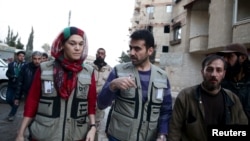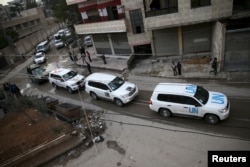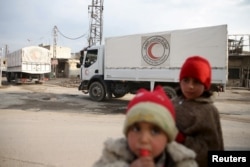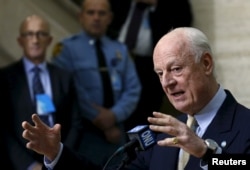The U.N. humanitarian chief said Wednesday that a nationwide cessation of hostilities due to start in Syria on Saturday must not be squandered.
“Enough is enough. This brutality must be brought to an end,” Stephen O’Brien told the U.N. Security Council in his monthly update on efforts to get life-saving aid to millions of desperate Syrians.
“In the Syrian conflict, there are no winners; everyone is losing,” he said, calling for an end to the five-year old conflict.
Since international talks in Munich earlier this month, aid access has improved to some hard-to-reach and besieged areas, but the need remains constant and urgent.
Obstacles
“Humanitarian operations cannot continue to be bogged down by unnecessary and unacceptable restrictions, obstructions and deliberate delays that are costing people their lives,” O’Brien said.
He noted that health supplies for 30,000 Syrians have been denied for aid convoys by the Ministry of Health. He also complained of lengthy bureaucratic delays and the need for “multiple layers of approvals” and “repeated rounds of negotiations” to approve aid deliveries.
O’Brien said there are currently over 40 outstanding requests to the government for aid convoys to deliver assistance to difficult to reach areas.
He also noted the excessive amount of time it takes to make deliveries once approved. He cited the town of Moadamiyeh, which, in peace time, is a 15-20 minute drive from central Damascus, but an aid convoy there this month needed 48 hours to clear all the checkpoints along the way.
Deliveries
The aid chief said that earlier Wednesday the U.N. had made a first air drop of 21 tons of aid items in the besieged northern town of Deir Ezzor. The Islamic State militant group seized much of that town last year.
Air drops are an option of last resort because of their logistical complexity. O’Brien said that initial reports from the Syrian Arab Red Crescent in the town said the pallets of aid had landed in the intended target area.
This month aid workers have had some success in reaching cut off areas of Syria with long-overdue aid to about 110,000 people. Deliveries have been made to 40,000 people in government-besieged Madaya and a thousand in Zabadani.
In rebel-controlled Fouah and Kefraya humanitarian workers have reached 20,000 people. Aid has also been delivered to 10,000 people in Eastern Ghouta’s Kafr Batna. They also reached 40,000 people in Moadamiyeh.
Political process
This week, a task force created by the International Syria Support Group (ISSG) will meet to help monitor the planned cessation of hostilities.
The U.N. Security Council will receive an update on the political process during a private meeting Friday. U.N. Syria envoy Staffan de Mistura will brief council members from Geneva in a video conference.
“We welcome the agreement that the U.S. and Russia have forged and we look forward to the cessation of hostilities coming into force on Friday, and to the political talks starting the week after that,” British U.N. Ambassador Matthew Rycroft told reporters.
Envoy de Mistura suspended an initial round of proximity talks between the Syrian parties earlier this month.
The Russian news agency Tass reported Wednesday that Russia wants a U.N. Security Council resolution supporting the cease-fire agreement. When asked about this by reporters, Russian deputy ambassador Petr Iliichev said “yes.”







